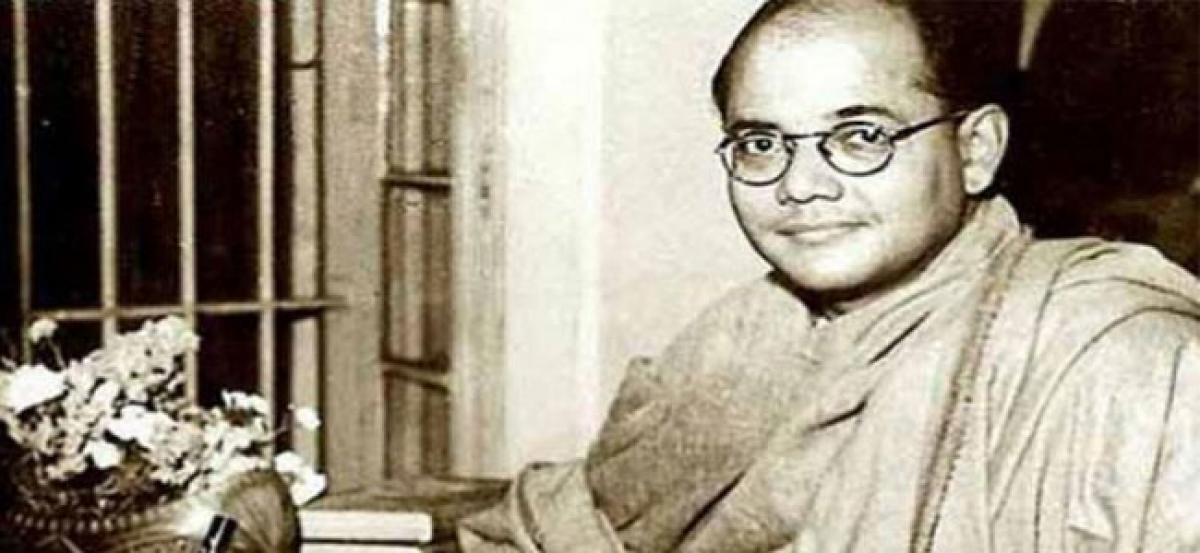Live
- Yanamala blames YSRCP policies for collapse of state economy
- Call to inculcate habit of reading books
- 63% parents give milk to their kids to maintain intake of calcium
- Maoist Leader Manjula Surrenders in Warangal, Receives ₹20 Lakh Reward
- Kartika Purnima celebrations fervour marks Telugu States, devotees flock to shiva shrines
- YSRCP alleges meagre fund allocations for Super Six schemes
- Telangana CM Reviews Plans for First Anniversary of State Government
- Vijayawada: Kindness Day celebrated
- Rajamahendravaram: Students advised to set clear goals
- Digital locker facility now available at Namma Metro stations
Just In

Questions over the death of Netaji Subhas Chandra Bose continue to perplex, the controversy acquiring the aura of a mystique over the decades.
NEW DELHI: Questions over the death of Netaji Subhas Chandra Bose continue to perplex, the controversy acquiring the aura of a mystique over the decades.
Author and Netaji's nephew Ashis Ray hopes to end the debate with his book "Laid to Rest", which collates the findings of 11 different investigations and concludes that he died on August 18, 1945 in a plane crash in Taipei.
Ray says his book is the "white paper" on the enduring mystery of when the freedom fighter died.The book, with a foreword by Netaji's daughter Anita Bose Pfaff, claims to end the controversy once and for all by putting across 11 investigations - official and unofficial - that come to the same conclusion.
"The crucial element as to why this matter festered for 72 years is the fact that his brother and mentor, the person who was the real arbiter of this situation, Sarat Bose, died in 1950 leaving this matter inconclusive.
"My book brings together 11 different investigations - four Indian, three Japanese, three British and one Taiwanese - which reached the conclusion that Netaji died on 18 August, 1945 following the plane crash," the London-based author said during the book launch at Bikaner House here earlier this week.
Giving details, Ray said the crash took place because the aircraft, which belonged to the Japanese Air Force, was "slightly" defective and nosedived as soon it took off from Taipei.
Though Bose came out alive, he died the same evening at the Nanmon Military Hospital.
"There were 13-14 passengers in the plane and half of them died. Netaji survived for few hours. There were seven survivors and six of them have repeatedly provided sworn testimonies as to what happen to them and what they saw, and it is something which is completely undeniable," he said.
Former ambassador Aftab Seth and historian Aditya Mukherjee put their weight behind the evidence presented in the book at the panel discussion, which preceded the formal launch of the book.
The panelists were unanimous in their view that "bad politics" was the reason mystical theories were doing the rounds even after three-fourths of a century.
The two speakers and the author also demanded that Netaji's remains, preserved in Japan's Renkoji temple, should be brought back to India. This is something his daughter wants as well.
"The Indian government after two years of declassifying all the documents has made no move to bring closure to this," Seth said, adding that it was high time the government of India makes a formal request for the ashes.It's an issue that is "screaming out loud" to be closed, Seth said.In December 2016, Prime Minister Narendra Modi released the first set of 100 declassified files pertaining to Netaji at the National Archives of India.
Why did Ray take so long to come out with a tell-all account of Netaji's death? Is it because of this void that stories, like the one about Netaji being disguised as a sadhu called 'Gumnami Baba', gain currency?
"The timing is right because the Netaji papers have ratified what I believed in for many years and now with more evidence at my disposal I think it is time to bring the matter to a close," the author replied to the questions put to him by PTI.

© 2024 Hyderabad Media House Limited/The Hans India. All rights reserved. Powered by hocalwire.com







